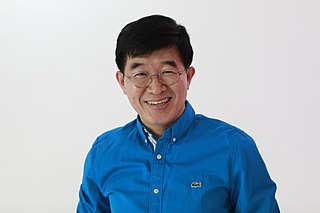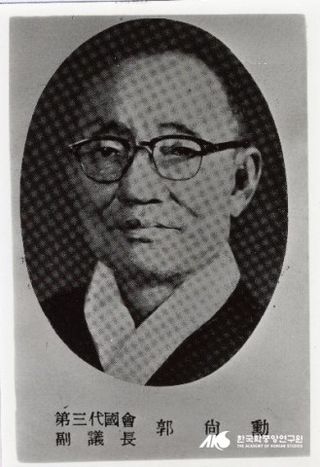
Many East Asian scripts can be written horizontally or vertically. Chinese characters, Korean hangul, and Japanese kana may be oriented along either axis, as they consist mainly of disconnected logographic or syllabic units, each occupying a square block of space, thus allowing for flexibility for which direction texts can be written, be it horizontally from left-to-right, horizontally from right-to-left, vertically from top-to-bottom, and even vertically from bottom-to-top.

Dongdaemun District is one of the 25 districts of Seoul, South Korea.
The Sinansan Line is the tentative name of a commuter rail line that will eventually link Cheongnyangni station with western Gyeonggi province, passing through key areas of the Seoul metropolitan area, including Yeouido, Yeongdeungpo and Gwangmyeong station.

Incheon Bus Terminal, not far from Incheon City Hall, is the busiest bus station in Incheon, South Korea and the main gateway for intranational buses connecting Incheon city. It is operated by Incheon Transit Corporation which was founded by the city government.

Choi Jin-sil was a South Korean actress. She was considered one of the greatest actresses in South Korea, nicknamed "The Nation's Actress" for playing leading roles in some of the highest-rated Korean dramas of all time such as Jealousy (1992), Season of Storms (1993), Star in My Heart (1997), You and I (1997) and My Rosy Life (2005). Her film work includes North Korea's Southern Army (1990), My Love, My Bride (1990), Susanne Brink's Arirang (1991) and The Letter (1997). Widely regarded as the most popular actress of her time, she led the entertainment industry in terms of commercial success across film, television, and advertising. She played leading roles in 18 films and 20 television dramas, appeared in hundreds of advertisements, and won several awards. She was 39 when she died by suicide by hanging on October 2, 2008, at her home in Seoul.

Song Yo Chan was prime minister of South Korea from 3 July 1961 to 16 June 1962. Previously, he had been the head of the Ministry of Foreign Affairs and Trade from 22 July 1961 - 10 October 1961 and was a lieutenant general. He ordered the arrest of corrupt officers in the army. He had studied politics and economics at George Washington University in Washington, D.C. During the final days of the First Republic of South Korea of president Syngman Rhee, he declared martial law and forced the president to resign. Song Yo Chan refused to quell student-led protesters even though the police asked for bullets and troops. These protests are known as the April Revolution.

Park Mi-sun is a South Korean comedian and TV host of variety shows, notably Quiz to Change the World, Happy Together - Season 3, and We Got Married. In 1988, She made her official debut with a gold prize in the 2nd MBC TV Gag Contest. In October 1991, She moved to SBS when SBS was launched. She married Lee Bong-won, who moved to SBS at the same time. She expanded her field of activity to KBS after she declared her freelance in September 1994. She also starred in the sitcoms Soonpoong Clinic, Hilarious Housewives, and All My Love.

Kim Hak-sun (1924–1997) was a Korean human rights activist who campaigned against sex slavery and wartime sexual violence. Kim was one of the victims who had been forced into sexual slavery by the Japanese Imperial Army between the early 1930s up until the end of the Pacific War. She is the first woman in Korea to come forward publicly and testify her experience as a comfort woman for the Japanese military. Her testimony was made on 14 August 1991. In December 1991, she filed a class-action lawsuit against the Japanese government for the damages inflicted during the war. She was the first of what would become hundreds of women from Korea, China, Taiwan, the Philippines, Indonesia, and the Netherlands who came forward to tell their stories of their enslavement to the Imperial Japanese military. She was inspired to finally take her story public after 40 years of silence by the growth of the women's rights movement in South Korea. Kim died in 1997 and her court case was still ongoing.
Park Hyun-yong is a South Korean former footballer who played as a defender.
Park No-bong is a South Korean former footballer who played as a defender.

Gong Byeong-Ho is a South Korean economist, and author. After graduating from Korea University, Gong received his Ph.D. in Economics at Rice University in 1987. Some of the books authored are, 10 Years Later, Gong Byeong-Ho's Self-Management, Standing Up as a One-Man Company, Thoughts of a Rich Man and Poor Man, Gong Byeong-Ho's Greek Classics. In the year 2013, Gong wrote Gong Byeong-Ho’s Life Philosophy, To My Son in the Military, Korea, 5 Years Later through the Lens of Developmental Psychology. In 2014, Gong wrote Gong Byeong-Ho’s Bible Study, God that Gong Byeong-Ho Met, Jesus that Gong Byeong-Ho Met. Gong is the president of the Gong Institute.

Marcel Călin Lăzăreanu is a Romanian retired football player. He is the father of Filip Lăzăreanu, who is also a goalkeeper.
Jang Bong-mun is a North Korean boxer. He competed in the men's middleweight event at the 1980 Summer Olympics.
Yushoku Cho, also known as Jang U-sik ; 18 January 1914 ~ 1971) was a Korean speed skater. He competed in two events at the 1936 Winter Olympics. He competed at the Japan Ice Championship on 25 January 1935, when he was attending Meiji University in Japan, and finished second with 10,000m at 19 minutes, 6 and 4th with 5,000 meters at 9:16. 5. He was selected as the Olympic by-election with Kunio Nado and Daikichi Nakamura. Afterwards, he participated in the 1936 Garmisch-Partenkirchen Winter Olympics, finishing 27th in men's speed skating 5000m and 26th in 10000m, but his personal record was broken. Post-Olympic deeds are not well known and the exact time of death is also unclear. According to Korean data, year 1971 was known as his last year, Marathon Athlete Sohn Kee-Chung also said in an interview with Dong-A Ilbo in 1976, "He has already passed away, and his life is futile."
Kim Bong-chol is a North Korean sports shooter. He competed in the men's 25 metre rapid fire pistol event at the 1992 Summer Olympics.
Kim Yong-un was a South Korean mathematician, philosopher, and critic of civilisations. He was active in various fields of mathematics, philosophy, anthropology, and linguistics, and is considered to have established the history of mathematics in Korea. He was a professor of mathematics at Hanyang University.
Centrist reformism is a South Korean political ideology. It is part of South Korea's centrist tradition.

Kwak Sang-hoon was a South Korean independence activist and politician who served as the 1st to 5th National Assembly member and served as acting president of South Korea for 7 days.

Shin Shin-ae is a South Korean actress and trot singer. She has been loved by the public for her appearances in various media, including television programs, television dramas, movies, and theater plays. She is known for her recent roles in the television dramas Hometown Cha-Cha-Cha and Lost. She is also known as a scene stealer in the box office movie Extreme Job (2019). She reunited with her She is also known as a scene stealer in the box office movie costar Lee Dong-hwi in the fifth film of Myung Film Lab,, which was a hot topic at the 2019 Jeonju International Film Festival. The movie was Gukdo Theater (2019).
The Korea Television and Radio Writers Association is a labour union based in Seoul, South Korea. Members are screenwriter, playwrights, and journalists who work in radio, films, TV, and digital media. There are currently around 3,700 active members.












